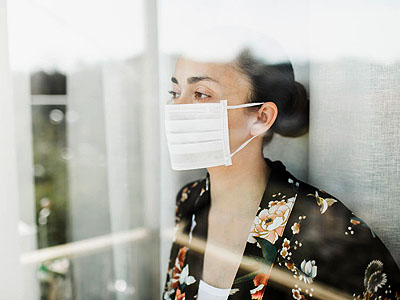-
With COVID Causing an Increase in Anxiety Disorders, Knowing Symptoms Of Anxiety Is Critical
- Posted on March 3, 2021
- by admin
- in All Articles, NFSB Blog
- Comments Off on With COVID Causing an Increase in Anxiety Disorders, Knowing Symptoms Of Anxiety Is Critical
 Did you know anxiety disorders affect 18.1 percent of Americans, according to the Anxiety and Depression Society of America, making anxiety the most common mental illness in the United States?
Did you know anxiety disorders affect 18.1 percent of Americans, according to the Anxiety and Depression Society of America, making anxiety the most common mental illness in the United States?“Everyone goes through a time in their life when they experience symptoms of anxiety,” said Staela Keegan, MSW, LCSW, LCADC, Interim Director of Clinical Services and Programming at Nutley Family Service Bureau (NFSB). “Anxiety is one of the most diagnosed disorders we see at NFSB. It happens to everyone, and it’s nothing to be ashamed of.”
Anxiety becomes maladaptive when a person can’t control their thoughts and stay in the moment. For example, they might be having a nice time with friends, but they can’t help thinking about what would happen if they had a car accident on the way home. If that happens, how will they get to work the next day?
As they project fear, nervousness, and worry into the future, these thoughts begin to snowball, which can lead to physical symptoms, like feeling flushed or jittery. This is how the body reacts to the threat of perceived danger.
Anxiety is different from a panic attack, which happens when someone experiences an overwhelming fear that something terrible is about to happen. More intense physical symptoms, like heart palpitations, shortness of breath, nausea, and tingling in the extremities can be severe enough to send someone to the emergency room because they think they’re having a heart attack.
How the Pandemic Is Causing Anxiety
COVID-19 has only made society as a whole more anxious. According to the Centers for Disease Control and Prevention (CDC), a survey in June of 2020 found that 30.9 percent of respondents reported symptoms of anxiety disorder or depressive disorder.
“Preteen and early teenage kids have come to us because they’re having difficulty with remote learning and social isolation,” Staela said. “People are worried about getting sick and infecting others. Many parents, especially single moms, are overwhelmed with working from home and remote schooling, often with little support. In many cases, their go-to coping mechanism, whether it’s going to the gym or getting together with friends, is no longer available. We help them develop new coping skills.”
To make matters worse, COVID-19 is ever-present. When people go to work or the supermarket, they’re putting on a mask and maintaining social distancing. The coronavirus is constantly on the news and social media, which only makes people more anxious. Even when people aren’t thinking about it, it’s always there. This can take up a lot of energy and deplete one’s ability to cope.
Symptoms of Anxiety Disorders
Someone who is dealing with anxiety often has trouble eating or sleeping. When their stomach is churning, the last thing they want to do is eat, and when they’re worried and restless, they can’t sleep. Lack of food and rest can contribute to fatigue, irritability, and difficulty concentrating.
Sadly, anxiety disorders can cause people to retreat from life. Essentially, anxiety can take a person’s world and shrink it, leaving them isolated and depressed. For example, someone with social anxiety disorder might not even leave the house because they’re nervous about social situations and afraid of being judged and embarrassed.
If left untreated, anxiety can cause more serious disorders, like a phobia (an irrational fear of a certain place, situation, or object). Anxiety disorders can also turn into obsessive-compulsive disorder (OCD). If a person can’t control their thoughts, they use repetitive, compulsive behaviors to calm themselves down.
In the next article, we’ll discuss what you can do to help a loved one who you suspect might be struggling with an anxiety disorder.
If you or someone you know is showing symptoms of anxiety disorder and needs help, call NFSB today at 973-667-1884 or visit our website to find out what resources we have available and schedule an appointment.
If you enjoyed this article please consider sharing it!
Archives
- April 2024
- March 2024
- February 2024
- January 2024
- December 2023
- November 2023
- September 2023
- August 2023
- July 2023
- June 2023
- May 2023
- April 2023
- March 2023
- February 2023
- January 2023
- December 2022
- November 2022
- October 2022
- September 2022
- August 2022
- July 2022
- June 2022
- May 2022
- April 2022
- March 2022
- February 2022
- January 2022
- December 2021
- November 2021
- October 2021
- September 2021
- August 2021
- July 2021
- June 2021
- May 2021
- April 2021
- March 2021
- January 2021
- December 2020
- November 2020
- October 2020
- September 2020
- August 2020
- July 2020
- June 2020
- May 2020
- March 2020
- January 2020
- November 2019
















